December 2017 LTCF Newsletter
- Happy Holidays!
- Update: New NHSN LTCF Annual Training Date!
- NHSN LTCF Component Updates Coming in January 2018
- Release of the New 2017 Long-term Care Facility Survey
- NHSN Release Management and Issues Webpage
- Updates to the NHSN Training Website
- Recap: ID Week 2017
- New E-Mail Helpdesk System
- Are you Ready for NHSN Re-Consent?
- Frequently Asked Questions
December 2017 Newsletter – Print version [PDF – 3 MB]
Happy Holidays!
This edition of the NHSN LTCF Component Newsletter contains several important updates and tips to ensure your continued successful use of the NHSN application. Please pay special attention to any upcoming deadlines. If you have questions, please contact us at nhsn@cdc.gov.
Thank you.
NHSN Long-Term Care Team
Update: New NHSN LTCF Annual Training Date!

The National Healthcare Safety Network’s (NHSN) 2018 Long-term Care Facility Annual Training is now scheduled to take place July 16 – 18, 2018 in Atlanta at the CDC. All three days will be dedicated to Infection Prevention and Surveillance in the Long-term Care Facility setting. Speakers will discuss a variety of topics including antibiotic stewardship, prevention and surveillance for UTI, C. difficile, multi-drug resistant organisms, antibiotic stewardship, and more. Users will also have the opportunity to participate in hands-on NHSN navigation and analysis training.
Stay tuned for more information in the new year.
NHSN LTCF Component Updates Coming in January 2018
- Minor updates made to the language in the UTI event section of the NHSN application to create consistency between the application, protocol, and printed event forms.
- Resident social security number (SSN) is changing from “required” to “optional” when reporting an infection event.
- A Custom Field Variable List has been added to help users to efficiently map their custom fields when running analyses.
- A Water Management Program section has been added to the NHSN Annual Facility Survey. The purpose of the additional questions are to identify current water management practices in place to minimize the risks for Legionnaires’ disease and other waterborne diseases associated with your building water system and devices.
Release of the New 2017 Long-term Care Facility Survey
NHSN will release the annual long-term care facility survey in early 2018. This mandatory survey should be completed by all enrolled facilities in NHSN to provide updated information on LTCF characteristics and practices. As in years past, users will not be able to submit surveys until NHSN releases them. Please wait for notification from us before starting one. Failing to do so will result in the loss of any information submitted into NHSN. We will provide printable copies of the survey and instructions on how to complete it by the end of December. All required questions must be answered before the application will save the survey. Therefore, once released, we recommend that users complete the paper version of the survey prior to entering the data into the web application.
The 2017 LTCF Annual Survey will include a new section of questions that ask about healthcare facilities water management practices and policies currently in place. These questions are optional for 2017, which means they do not have to be answered in order to successfully save an annual survey. We do kindly ask that users make every effort possible to respond to these questions as they will inform the CDC of current prevention activities in place that contribute to the control of Legionella and other water-borne diseases in healthcare facilities. Details about how to respond to these questions will be included in the table of instructions that are released with the updated NHSN Protocol. If you have additional questions in regards to this section, please contact the helpdesk at nhsn@cdc.gov for further clarification.
Please remember, Annual Facility Surveys must be completed and submitted in NHSN by March 1, 2018. Facilities that do not meet this deadline will be unable to complete monthly reporting plans. For guidance and support, contact our support team at nhsn@cdc.gov. Use the phrase “LTCF Annual Survey” in the subject line to expedite the response time.
NHSN Release Management and Issues Webpage
We are pleased to announce the rollout of the new NHSN Release Management and Issues webpage. This page is a resource that lists all known NHSN defects that impact the application.
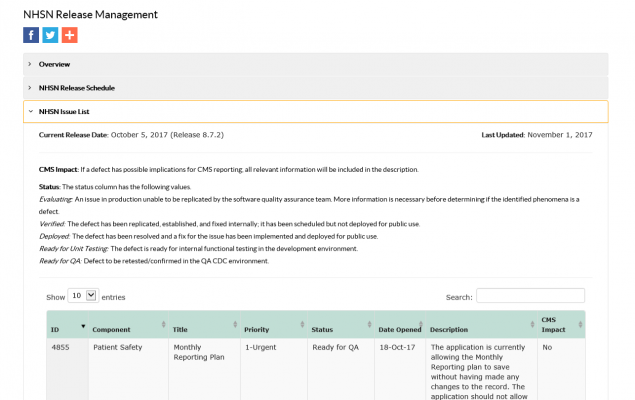
Access the NHSN Release Management and Issues webpage. Bookmark this link and check back often for updates.
Updates to the NHSN Training Website
We have listened to your feedback and made a few changes to the NHSN Training website. Here are a list of a few major changes:
- New homepage layout
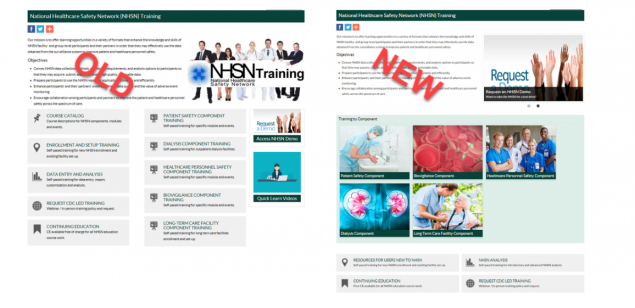
- Emphasis placed on each NHSN Component. Clicking on each icon will take the user to a comprehensive list of training for the respective component. The sixth space will be used for the incoming Outpatient Procedure Component.
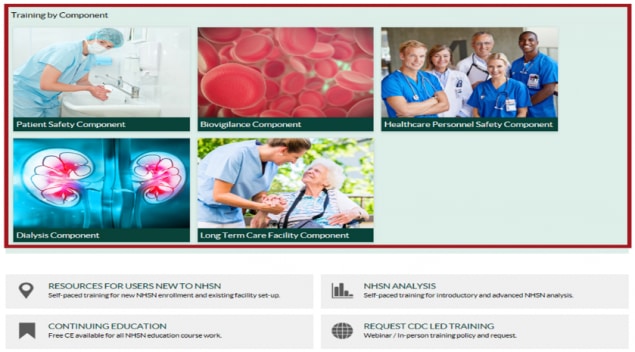
- Removal of the Course Catalog. All available training courses and material are organized by component and listed on the respective component pages.
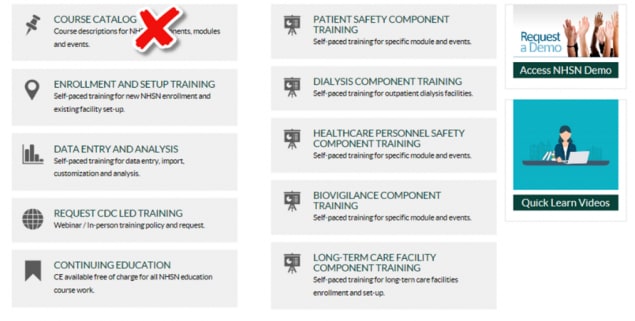
- The “Enrollment and Set-up Training” icon has changed to “Resources for Users New to NHSN”. The resources for users new to NHSN includes enrollment and set-up training, as well as the links to the interactive, self-paced training activities recommended for new NHSN users.

- NHSN offers free continuing education credits for the archived web-stream videos of the annual NHSN Training and the self-paced, computer-based training modules (not currently available to Long-term Care Facility users). Instructions for obtaining CE and links to all training activities are available and linked on the Continuing Education page:
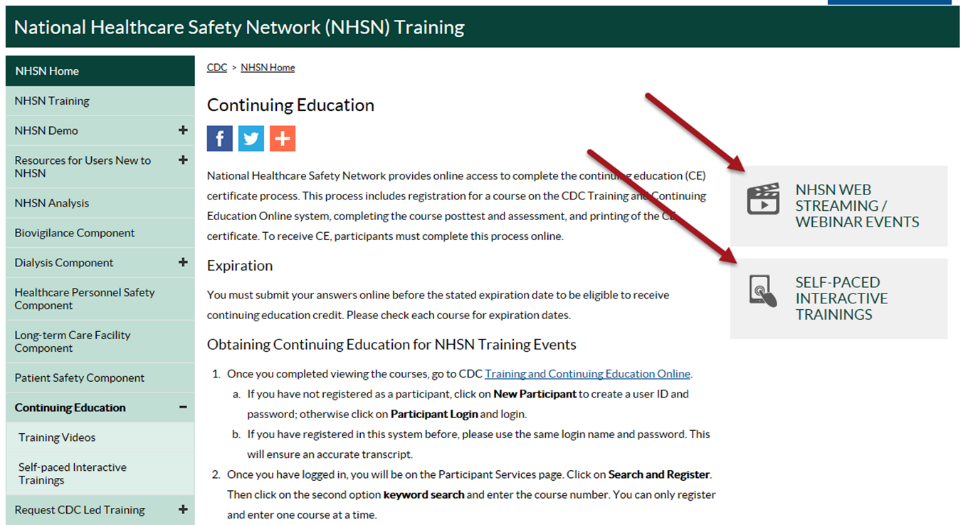
Recap: ID Week 2017
IDWeek is the combined annual meeting of professional infectious disease organizations where professionals meet, share experiences, and develop collaborations. CDC staff presented scientific abstracts at ID week that underscored the importance of conducting surveillance among older adults and nursing home residents. The abstracts are available online and can be viewed by clicking the links below:
- Antibiotic Stewardship and Urinary Tract Infections in U.S. Nursing Homes Reporting to the National Healthcare Safety Network 2015-2016
- Outpatient Antibiotic Prescribing Among Older Adults in the United States, 2011 to 2014
New E-Mail Helpdesk System
In the coming months, we will be implementing a new helpdesk ticketing system called iSupport to improve our efficiency in assisting users. This in turn, will change the way that we communicate with you when an inquiry is sent to nhsn@cdc.gov. Once the system has been fully implemented, you will receive an automated email notification with an assigned ticket number. This will allow us to track the life cycle of your issue from the time a ticket is opened until it is closed. The process has not been finalized, but we will send out more information as we get closer to a go-live date. We are excited about this change and feel that it will enhance our ability to better serve you.
With iSupport, we will be able to:
- Triage and respond to emails in a more expeditious manner
- More effectively retrieve tickets sent by a given user
- Provide a greater level of accountability as tickets are easily tracked within this system
Are you Ready for NHSN Re-Consent?
The CDC’s updated version of the NHSN Agreement to Participate and Consent launched in December 2017 for new enrollees and in January 2018 for current facilities. The updated agreement includes operation changes and an updated NHSN purpose.
While the NHSN team will use various communication efforts to remind participating facilities of the re-consent process, keep in mind the following:
- For current NHSN facilities, either the NHSN primary contact for the facility or the assigned NHSN Facility
Administrator will need to log into NHSN and accept the new Agreement to Participate and Consent (or “re-consent”) when it is released in January 2018. - All NHSN user facilities will need to accept the new Agreement to Participate and Consent (or “re-consent”) by the April 14, 2018 deadline.
- If a component fails to re-consent by the deadline, its NHSN functionality will be suspended until the consent form is accepted by either the facility’s assigned primary contact or NHSN facility administrator.
Tips to Prepare for the NHSN Re-Consent:
- Verify the accuracy of the assigned NHSN facility administrator and/or the primary contact listed in the NHSN application and updated information as needed.
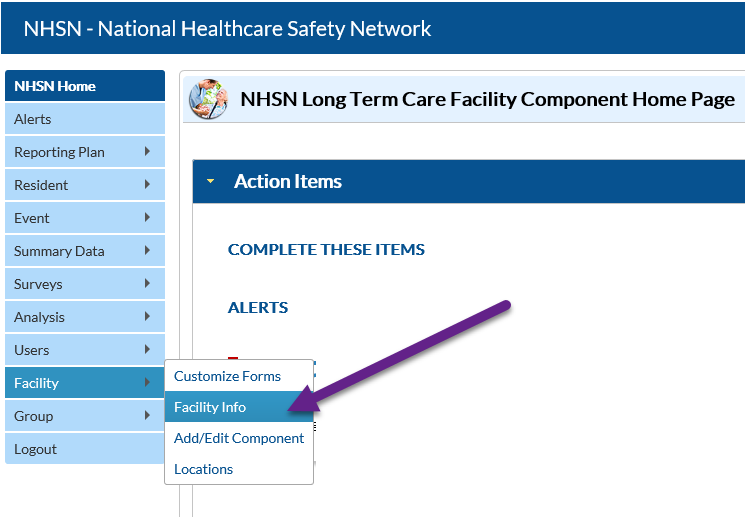


- The NHSN facility administrator can easily edit and update or reassign the NHSN facility primary contact to another registered user in the facility.

- If the NHSN facility administrator is no longer with the facility, the NHSN Facility Administrator role must be re-assigned to another NHSN user.
- Keep in mind:
- New NHSN users must complete the SAMS process.
- If the previous NHSN facility administrator is no longer available, the facility must submit a written and signed letter (on facility letterhead) to NHSN requesting the NHSN facility administrator role to be re-assigned to a new individual. This letter should include the name of the new NHSN facility administrator to be assigned, phone number, and email address, as well as the 5-digit NHSN Facility ID, if known. The signed letter may be faxed to NHSN at (404) 929-0131 or scanned and emailed to nhsn@cdc.gov.
Frequently Asked Questions
Question: When are data considered complete in NHSN?
Answer: Data are considered complete in NHSN once facilities complete all of the following:
- The Annual Facility Survey
- A monthly reporting plan for months in which the facility plans to perform surveillance and submit data to NHSN
- Submit event data to NHSN using the NHSN Multidrug-Resistant Organism & Clostridium difficile Infection (MDRO/CDI) Module protocol
- Indicate “no events” on monthly summary data page if no events were found for the month
- Submit monthly summary data to NHSN
- Resolve all alerts